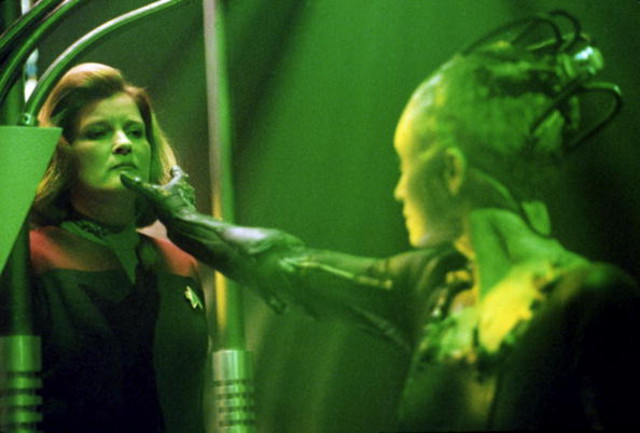'Star Trek' and how to police the 'Walking Dead': Stephen Carter

There’s a two-part episode of the television show “Star Trek: Voyager” in which Captain Janeway and her crew, on their multi-decade journey home from the Delta Quadrant, encounter another Federation ship, also trapped tens of thousands of light years from Earth. The episode, a cliffhanger bridging seasons five and six, shows us an alternative to Janeway’s determination to stick to Starfleet protocol and values, even when her crew might never see home again. The captain of the other ship, the Equinox, has abandoned Starfleet ethics to maximize his crew’s chances of reaching Earth. In particular, the captain has been trapping sentient aliens who can power the ship and killing them in the process. We are meant to understand that Janeway, by contrast, would allow her crew to perish rather than engage in such tactics.
The writers intend a controversial lesson: In the face of disaster, it’s right to stick to your principles, even when they reduce your chances for survival.
The Equinox story came to mind as I watched “Crossed,” the slow moving and, alas, highly predictable seventh episode in season five of “The Walking Dead.” I’ve been posting about the ethical questions the show raises, but Sunday night, for the second week in a row, the writers chose to steer clear of dilemmas that provide meat for moral analysis.
Lamson, a former Atlanta police officer, still wears his uniform but now is part of the little hospital kingdom where Dawn insists that she's keeping civilization alive by allowing the cops under her command to run rampant. The implication of Lamson’s remark would seem to be that after the collapse of authority, the ethics of police work -- whatever they are -- no longer hold.
We instinctively resist this notion, but there is much to be said for it. Rick, a former sheriff, himself has engaged in plenty of conduct that wouldn't be justifiable under what we might think of as the ordinary ethics of law enforcement. Just a few episodes ago, you’ll recall, he and others in his group beat Gareth and his cannibals to death.
Rick would presumably argue that what he sees -- and what Lamson misses -- is that there is a larger police ethic at work: the rule that requires the officer to protect the community. Perhaps, then, what has changed is not the ethic, but the definition of the community itself. Rick has thus set himself the narrow (and tautological) role of protecting those who are under his protection.
But here things get tricky. After all, Dawn, also a former police officer, would respond that she is doing exactly what Rick is doing. Were she to forbid her officers to rape (Dawn would surely argue), she would be unable to protect the survivors hiding in Grady Memorial Hospital.
Thus, Lamson would seem to be correct. The real police officers died when the government died. They didn’t die physically. The role itself no longer exists. Rick and Dawn, both former cops, are doing what they deem necessary to protect their groups of survivors. The difference between them isn’t that Rick is acting like a police officer and Dawn isn’t. Neither is acting according to any recognizable ethic of law enforcement. The difference between them must be drawn on one of the following grounds:
- First, we might decide that Dawn’s judgment is objectively
unreasonable -- that she is wrong in thinking that there is no
other way to protect her people.
- Second, we might decide that Rick’s methods are more defensible than Dawn’s without regard to whether they are undertaken by a police officer or anyone else. Put otherwise, the fact that Dawn’s crumbling empire is protected by those who wear police uniforms does not confer any special moral impunity.
I’d rather go with the second distinction than the first because I don’t think that we should hide serious moral judgments behind contestable factual claims. Dawn’s decision to protect her people by permitting rape may not be wrong for the same reasons as the decision by the captain of the Equinox to protect his people by permitting murder. Each, however, rises to a sufficient level of outrageousness that ethics will neither justify nor excuse it, even to save lives.
Except maybe the question of why a battle-hardened survivor of the zombie apocalypse such as Sasha would turn her back, even for an instant, on a prisoner whom she had allowed to inveigle her into freeing him from the pillar to which he was tied. One might draw a distinction by pointing out that Dawn’s officers are raping members of the protected community -- in other words, the rape culture she is enabling reduces the safety of those inside the hospital that is meant to be a sanctuary. But this is a non sequitur. It’s difficult to believe that the practice would be significantly less objectionable were the officers raping only women who were outside the hospital.
Here we are to serve you with news right now. It does not cost much, but worth your attention.
Choose to support open, independent, quality journalism and subscribe on a monthly basis.
By subscribing to our online newspaper, you can have full digital access to all news, analysis, and much more.
You can also follow AzerNEWS on Twitter @AzerNewsAz or Facebook @AzerNewsNewspaper
Thank you!
